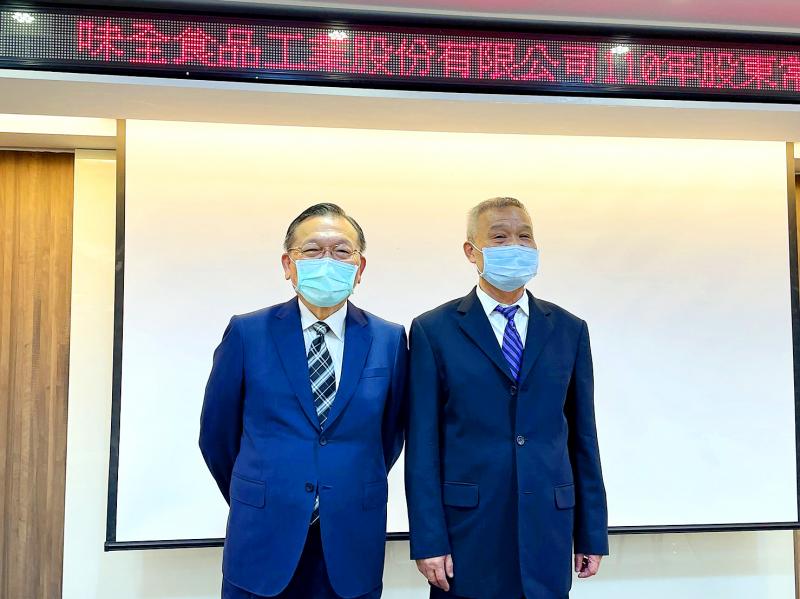Despite the lingering effects of the COVID-19 pandemic, Wei Chuan Foods Corp (味全食品) remains upbeat about its business outlook this year, the company said yesterday.
“The sun is still rising,” Wei Chuan general manager Chang Chiao-hua (張教華) said at the company’s annual general meeting in Taipei yesterday.
“While the COVID-19 situation did affect the food industry this year and last year, our sales are going in the right direction,” he said.

Photo: Amy Yang, Taipei Times
“The pandemic has hit the food and beverage sector, but by researching markets and paying close attention to consumer behavior, we were able to adapt and improved our sales to big-box retailers,” Chang said. “Overall, our revenue is growing, despite the pandemic.”
For the first half of this year, Wei Chuan reported revenue of NT$9.31 billion (US$335.23 million), up 8.4 percent year-on-year, while net profit was NT$183 million, up 69.26 percent from a year earlier, or earnings per share of NT$0.36.
The company’s revenue fell 7.8 percent year-on-year to NT$18.65 billion for the whole of last year, with net profit decreasing 60.36 percent to NT$586.86 million, company data showed.
Despite dealing with the pressure of increased logistical and material costs, Chang said that Wei Chuan would not be raising its prices.
Instead, “we will adjust our product mix and enhance our sales push on high-margin products,” he said.
Sales of Wei Chuan’s flagship line of Lin Feng Yin (林鳳營) dairy products plunged 50 percent at local drink stores and restaurants after the COVID-19 outbreak in May, but their retail sales still increased, Chang said.
However, Lin Feng Yin’s market share slid from about 40 percent to about 22 percent, he said.
The company is working hard to develop new products to meet people’s needs in the post-pandemic era and hopes to keep revenue growth within a reasonable range this year, he said.
Wei Chuan’s core brands are doing well in China, and the company is continuing to cultivate the eastern market while moving into the northern market, Chang said.
Wei Chuan shareholders yesterday approved the company’s distribution of a cash dividend of NT$0.53 per share, based on last year’s earnings per share of NT$1.06.

Taiwan would remain in the same international network for carrying out cross-border payments and would not be marginalized on the world stage, despite jostling among international powers, central bank Governor Yang Chin-long (楊金龍) said yesterday. Yang made the remarks during a speech at an annual event organized by Financial Information Service Co (財金資訊), which oversees Taiwan’s banking, payment and settlement systems. “The US dollar will remain the world’s major cross-border payment tool, given its high liquidity, legality and safe-haven status,” Yang said. Russia is pushing for a new cross-border payment system and highlighted the issue during a BRICS summit in October. The existing system

Taiwan Semiconductor Manufacturing Co (TSMC, 台積電) is expected to grow its revenue by about 25 percent to a new record high next year, driven by robust demand for advanced technologies used in artificial intelligence (AI) applications and crypto mining, International Data Corp (IDC) said yesterday. That would see TSMC secure a 67 percent share of the world’s foundry market next year, from 64 percent this year, IDC senior semiconductor research manager Galen Zeng (曾冠瑋) predicted. In the broader foundry definition, TSMC would see its market share rise to 36 percent next year from 33 percent this year, he said. To address concerns

Intel Corp chief financial officer Dave Zinsner said that a formal separation of the company’s factory and product development divisions is an open question that would be decided by the chipmaker’s next leader. Zinsner, who is serving as interim co-CEO following this month’s ouster of Pat Gelsinger, made the remarks on Thursday at the Barclays technology conference in San Francisco alongside co-CEO Michelle Johnston Holthaus. Intel’s struggles to keep pace with rivals — along with its deteriorating financial condition — have spurred speculation that the next CEO would make dramatic changes. That has included talk of a split of the company’s manufacturing

PROTECTIONISM: The tariffs would go into effect on Jan. 1 and are meant to protect the US’ clean energy sector from unfair Chinese practices, the US trade chief said US President Joe Biden’s administration plans to raise tariffs on solar wafers, polysilicon and some tungsten products from China to protect US clean energy businesses. The notice from the Office of US Trade Representative (USTR) said tariffs on Chinese-made solar wafers and polysilicon would rise to 50 percent from 25 percent and duties on certain tungsten products would increase from zero to 25 percent, effective on Jan. 1, following a review of Chinese trade practices under Section 301 of the US Trade Act of 1974. The decision followed a public comment period after the USTR said in September that it was considering